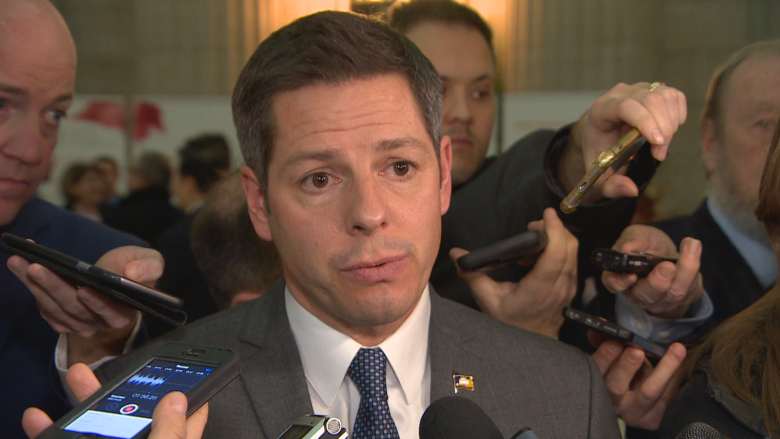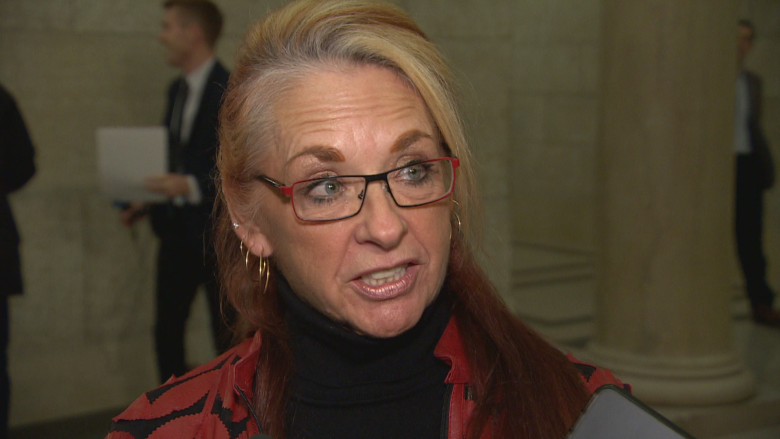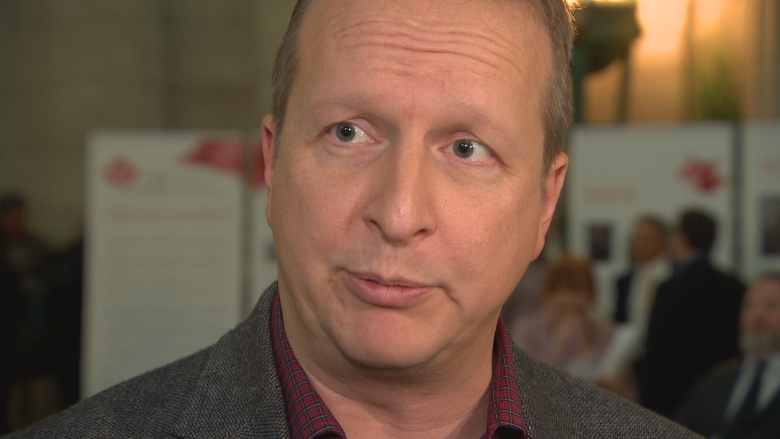Winnipeg's biggest priorities absent from provincial throne speech: mayor
The day before delivering the city's budget, Winnipeg Mayor Brian Bowman said he was disappointed by a provincial throne speech he worries could leave the city picking up the province's financial slack.
"What we were looking for in this speech from the throne was a sign that the government has the priorities of Winnipeggers in mind. Unfortunately, we did not hear that today," Bowman told reporters after the speech Tuesday afternoon.
The speech heralded the opening of the latest session at the Manitoba Legislature and laid out a roadmap for how Premier Brian Pallister plans to steer the province in the coming months.
But Bowman said it didn't address Winnipeg's top three priorities: funding for roads, transit and long-term economic development.
He's concerned that means those costs will be downloaded from the province to the city.
"We saw offloading begin this year, and we saw it with the unilateral elimination of the Building Manitoba Fund, with the unilateral elimination of the transit cost-sharing arrangement," Bowman said. "We don't want to see that going forward."
Earlier this year, the province announced it would stop paying half of the city's operating costs for transit that aren't covered by fare revenue — a hit of roughly $10 million, Bowman said.
Last week, Bowman warned the change could result in layoffs, fare hikes and service reductions, including the elimination of 59 bus routes. On Tuesday, Bowman said he'd provide more detail on when that might happen when announcing his budget Wednesday.
Organized labour wary of cuts
Bowman wouldn't speculate on the possible results of a review of current provincial and municipal service responsibilities — a review the province said in its throne speech it intends to conduct to find overlap and duplication.
The goal of the review will be to "streamline service delivery such as road maintenance and renewal, snow clearing, water control and drainage at the most appropriate level of government," according to the speech.
Michelle Gawronsky, president of the Manitoba Government and General Employees' Union, said the province will be shirking responsibilities if it shifts those jobs to municipal workers.
"I've got some major concerns. I am coming away with more questions than answers, once again," she said.
In the past year, the province has cut roughly 700 jobs in the civil service alone, she said, primarily through attrition. In the throne speech, the province announced plans to forge ahead with reducing "the spans and layers of senior management" in the public service through a "public service transformation strategy."
Pallister wouldn't rule out layoffs as part of that process, but attrition continues to be the province's focus, he said.
"That, to me, means more cuts are coming to the public service," said Kevin Rebeck, president of the Manitoba Federation of Labour.
"And that's not what Manitobans want. And that's what this government got elected on. They can keep trying to make that claim. But they got elected on a promise to protect and improve public services, and they are not living up to it."
Despite his concerns, Bowman said he's had good conversations with the province as recently as last week. There's room for collaboration on throne speech items like a plan to restructure economic development efforts in Winnipeg, he said — as long as the city is invited to the table.
Currently, Winnipeg is home to dozens of economic development groups, and potential investors have to navigate a sea of meetings before they can bring their money here, Pallister told reporters in a briefing before the throne speech.
Lorne Remillard, president of the Winnipeg Chamber of Commerce, said he's not against consolidation, but he wants to see a strategy before the province makes changes.
"Otherwise, you're just taking a look at a spreadsheet and going, 'Where can we save money?' But that might not necessarily be the best decision in terms of what you're trying to do economically," he said.
AMC denounces child-welfare changes
Remillard said the speech was "light on detail" — he would have liked to hear plans to update Manitoba's "antiquated" taxation system, for instance — but overall, balanced. He called it "encouraging" to see the province turn its gaze to social issues on top of finance.
The speech highlighted "fundamental transformations" to the province's child-welfare system, announced in October, including new legislation to make it easier for foster parents to become guardians.
Manitoba has the highest rate of children in care in the province, with roughly 11,000 children in the system, according to the province. Nearly 90 per cent of those children are Indigenous.
Cora Morgan, the First Nations Family Advocate with the Assembly of Manitoba Chiefs, says most Indigenous kids don't end up with Indigenous families.
The assembly denounced the province's plan in a news release on Tuesday.
"It seems like they're further down the road with these reactionary measures, instead of getting in front of the issue and working with families, and looking at the family and providing resources and supports for the family to help that reunification," " Morgan said.
"I don't know why they couldn't have come up with a model that would have promoted that instead of a model that would make children permanent under the system."
She said she expected "far more" of the Progressive Conservative government.




